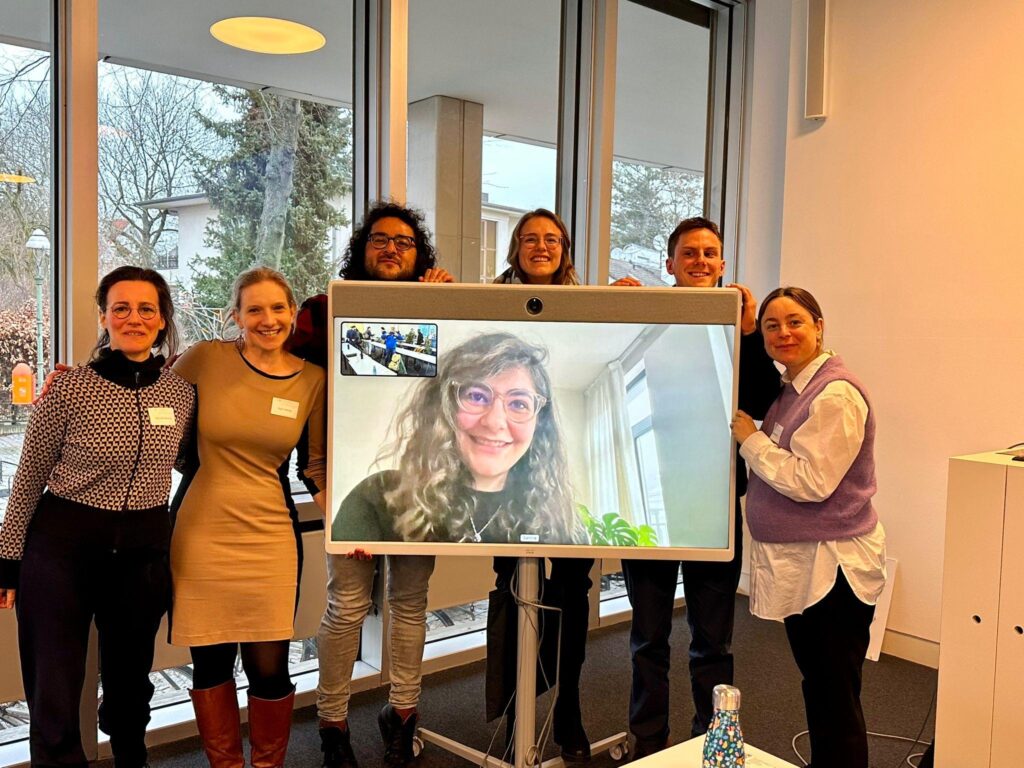
SMASCH Festival 2023
What do we discover when we explore the intersection between digitality, school and creativity? From June 26 to 30, 2023, the SMASCH Festival took place in cooperation with Fundus Theater. For one week, students and educators from the SMASCH project schools embarked on a journey of exploration online and in the theater.

AI-day with Belgian SMASCH schools
Triggered by the recent hype around AI tools such as ChatGPT, delegates from all four Belgian SMASCH schools met on May 2, 2023, in Leuven to exchange knowledge and to learn more about AI’s educational relevance and challenges.

SMASCH Panel at the conference of the Section for Intercultural and International Comparative Education
Under the slogan “Researching, reflecting and
accompanying transformation processes” this year’s conference of the Section for International and Intercultural Comparative Education (SIIVE) of the German Society for Educational Science (DGfE) took place at Freie Universität Berlin on March 9 and 10, 2023, including a panel on the SMASCH project.

First international SMASCH workshop in Hamburg
From September 18 to 21, 2022, Belgian and German representatives of the SMASCH project schools physically met for the first time. A Belgian delegation of ten teachers, five researchers and two representatives of a teachers’ union visited Hamburg to attend an interactive workshop and visit the German project schools.

SMASCH Kick-off
Half a year after the start of the SMASCH project the Kick-off on February 24, 2022, invited the participants to discuss opportunities and challenges that occurred within the scope of the project so far. In the scope of a panel discussion and a virtual networking event, the SMASCH schools as well as external stakeholders exchanged their perspectives on the project. Key words, such as the development of new learning cultures as well as the emergence of a “new normality”, were controversially discussed from different perspectives.

Webinar „Pedagogically sustainable school development in the digital age: Orientation and specific ideas”
On the February 8, 2022, Iza Czarnojan, media educator and school developer, worked with the webinar participants on the question what school development in the digital age actually means and how you can find orientation as a school. She presented easy ways how to concretely shape a school development process and gave the possibility to exchange experiences in an interactive format.
Slides will be shared on request.

Webinar „Analog-Digidaktik: Active media and computer education unplugged”
Digitalization without a screen? Computer-science without a computer? On November 23, 2021, Prof. Paula Bleckmann (Alanus Hochschule Alfter) and Brigitte Pemberger (Alanus Hochschule Alfter) gave insights into the project “Analog-Digidaktik” and showed how basic knowledge on computer-science and logics in the digital world can be transferred by analogue teaching concepts. In an interactive format, participants were able to try out ideas for their teaching and critically reflect on them.
Slides and teaching material (in German) will be shared on request.

Q&A-session with the project leads
In all schools, first workshops and talks have taken place. The schools had the opportunity to get a first impression of SMASCH and the SMASCH-team had many interesting encounters in the schools. In the Q&A-session on November 15, 2021, the project leads, Prof. Sigrid Hartong and Prof. Tobias Scheytt, gave principals and teachers the possibility to ask their questions on the project and presented first ideas on how the further project roadmap could look like.

Webinar „Empowering children against digital risks”
On October 26, 2021 the SMASCH webinar series “How does that work? – Shaping school in the digital age” started. Prof. Paula Bleckmann (Alanus Hochschule Alfter) and Susanne Peter (Initiative ECHT DABEI) discussed with representatives from the SMASCH-schools how children’s health should be part of the digitization discourse at schools. Additionally they gave insights into how parents can be included in the prevention work.
Slides and teaching material (in German) will be shared on request.






International Team-Workshop
From October 24-26, 2021, the first joint workshop with researchers from Helmut-Schmidt-University and KU Leuven took place. The workshop’s topic was „Stimulation of Digital Maturity in the Field? The Researcher’s Role in Participatory Research“. During the two days, the researchers presented their research topics and developed further conceptual steps for international exchange between the SMASCH schools and for the project’s research design.

Exchange on IT-infrastructure
On August 30, 2021, representatives of the SMASCH-schools met to talk about demands and questions regarding IT-infrastructure. The event was accompanied by a media educator as well as an IT-specialist to start establishing demand-oriented support for the German SMASCH-schools.

Presentation at “heimspiel.Für Bildung”
On August 18, 2021, Prof. Dr. Sigrid Hartong held a presentation on sustainable education strategies for digital maturity (original title: „Für eine nachhaltige Bildungsstrategie digitaler Mündigkeit: Wo stehen wir, wohin wollen wir?“) in the scope of the initiative „heimspiel. Für Bildung“ run by Alfred Toepfer and Joachim Herz foundation. Together with representatives from the SMASCH-schools and other schools, she discussed the question of how digital technology and learning about digital technology can be shaped in a sustainable way.
Here you can find the slides (in German).
